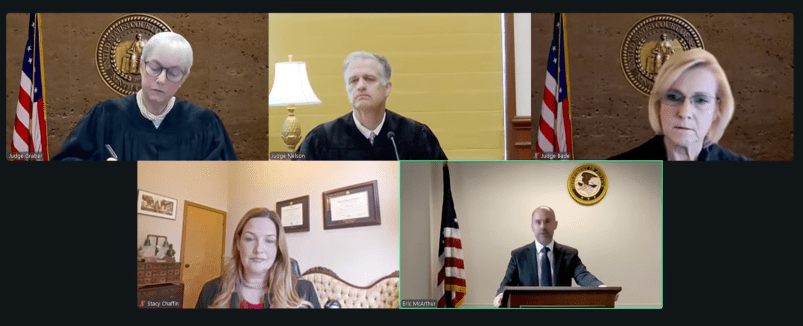9th Circuit Judge Ryan Nelson argued so vehemently Thursday that President Trump has the power to deploy the National Guard into unwilling states on very little pretext that one suspects the arguments were doubling as his Supreme Court audition.
“The President gets to direct his resources as he deems fit and it just seems a little counterintuitive to me that the city of Portland can come in and say ‘no, you need to do it differently,’” Nelson said to Oregon’s Senior Assistant Attorney General Stacy Chaffin. “Now, I understand there’s a statute here and we’re going to have to review that, but this goes to the level of deference that I think the president is entitled to in these circumstances. And it’s not all driven by what we see on the streets, it’s also driven by, to some degree, what’s going on behind the scenes, and you don’t have full view into that.”
By Oregon’s lights, per its briefs, what was “going on behind the scenes” was Trump watching Fox News air B-roll from 2020 protests in Portland, and concluding that the “war ravaged” city needed an infusion of National Guard troops.
Nelson, with fellow Trump appointee Judge Bridget Bade (who already appeared on a list of potential Trump Supreme Court picks), were vociferous in their support of Trump deploying troops to Portland, no matter that the incidents the Justice Department pointed to as pretext occurred months before the mobilization.
“If you don’t hit it within a narrow window you lose your right — that just seems unnaturally constrained,” complained Nelson in response to Chaffin’s arguments that the most intense protests in Portland happened back in June and July, months before the late September mobilization. He added that Trump’s sending in of other federal officers “hasn’t abated it,” that there’s “still violence going on,” despite the district court’s finding that there is no current significant unrest.
District Court Judge Karin Immergut, a Trump appointee who blocked the Oregon National Guard and then National Guard from any state from deploying to Portland, was the subject of unrelenting criticism during Thursday’s arguments.
The DOJ’s Eric McArthur, using language attorneys generally avoid when still before a judge, said that she’d “refused” to take into account evidence of unrest from earlier in the summer, which she was “clearly wrong” to do, and that she “did minimize” episodes in September as well.
Nelson piled on, saying that Immergut’s definition of “rebellion” — one of the criteria for sending in the Guard under Title 10, the law the administration has cited — is so narrow that President Lincoln wouldn’t have been able to bring in forces if he didn’t do it immediately after the Battle of Fort Sumter.
This same panel, rounded out with a Clinton appointee, on Wednesday granted the DOJ’s request for an administrative stay freezing Immergut’s first temporary restraining order, which blocked the mobilization of the Oregon National Guard. At that point, her second temporary restraining order — which she’d handed down in an emergency hearing after the Trump administration deployed the California and Texas National Guard to circumvent her first order — was not before the panel. So in effect, all Guard were still blocked from entering Portland.
That state of affairs will likely not last long.
“These are violent people, and if at any point we let down our guard, there is a serious risk of ongoing violence,” DOJ’s McArthur concluded to the friendly panel.
